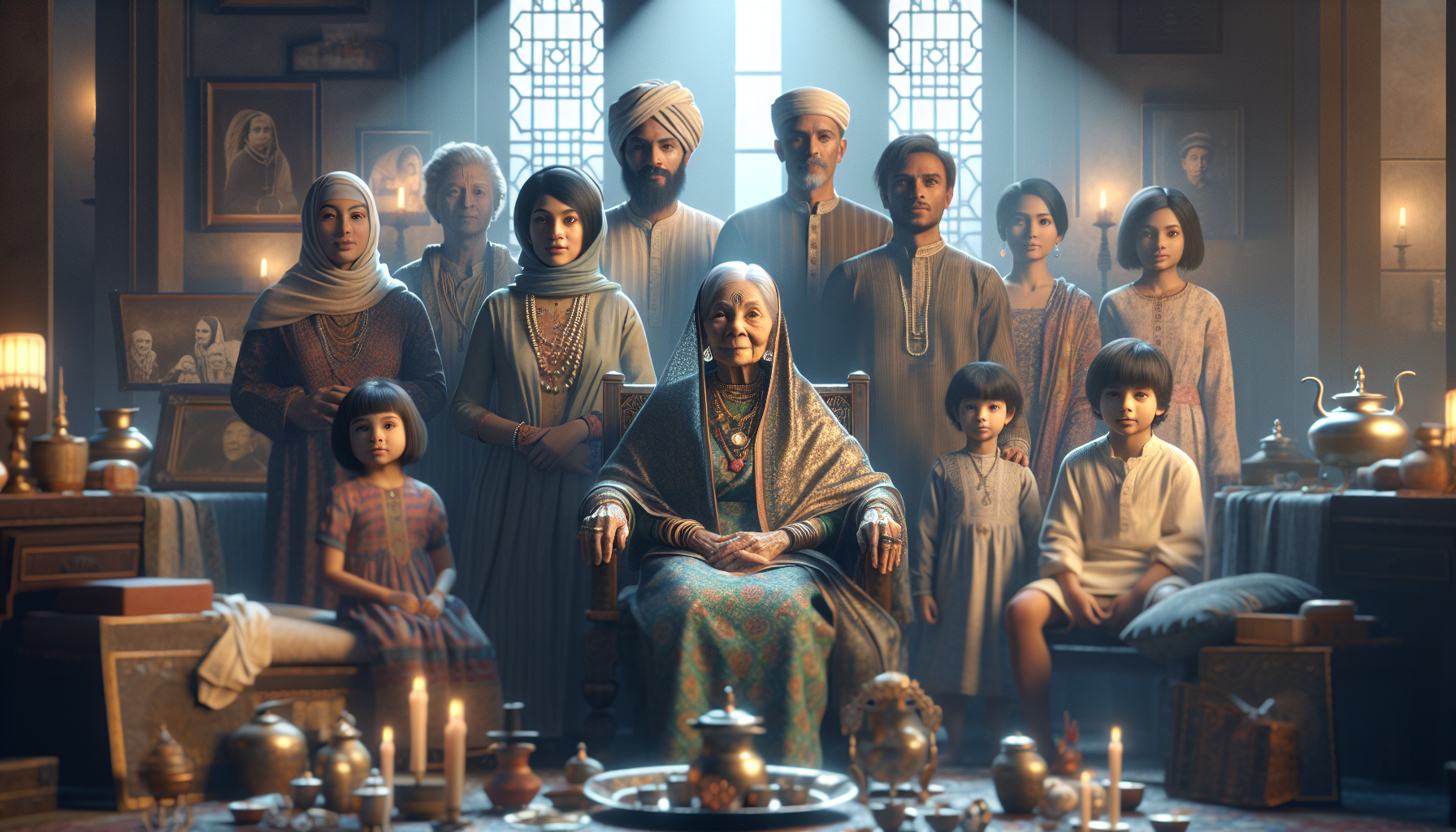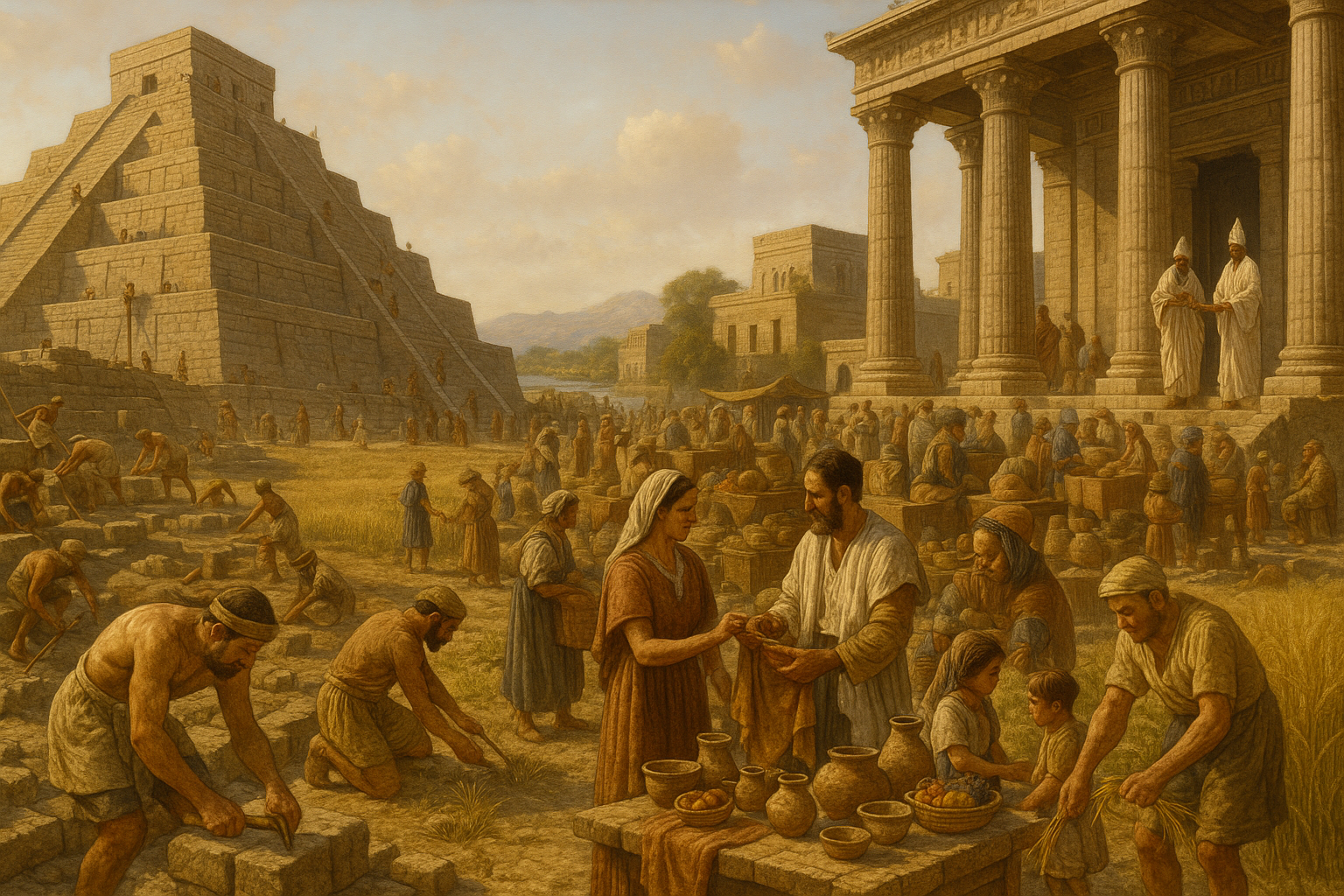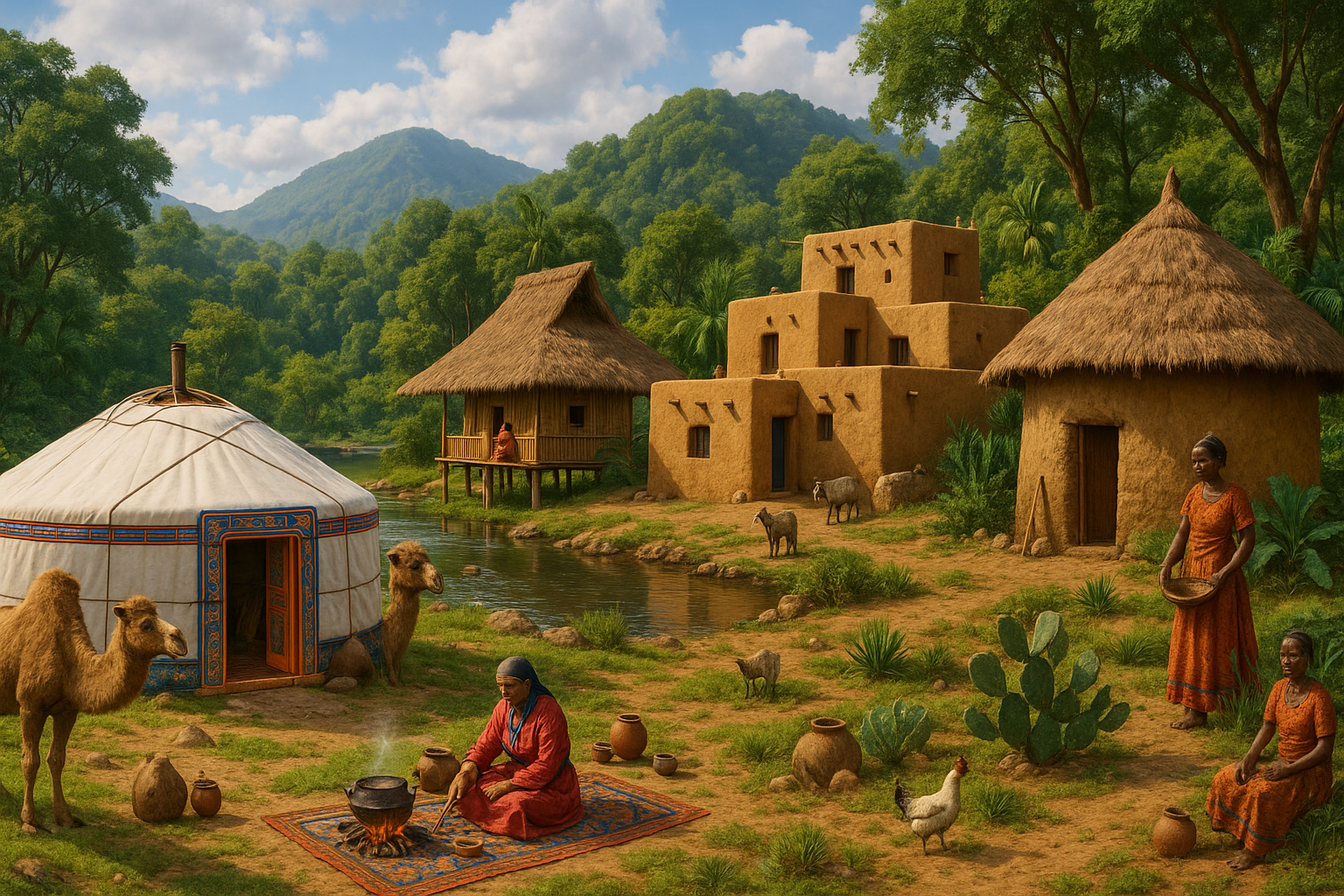In a world that constantly looks forward, driven by innovation and the relentless pursuit of progress, it’s easy to overlook the profound influence of our past. Yet, beneath the surface of modern societies lies an intricate web of traditions and beliefs that have been carefully woven by our ancestors. Among these age-old practices, ancestor worship stands as a silent yet powerful force that has helped shape the very foundations of our social structures. This article delves into the fascinating realm of ancestor worship, exploring its pivotal role in molding the societies we inhabit today and uncovering the enduring impact it has on our cultural fabric.
As we embark on this exploration, it’s important to understand that ancestor worship is not merely a relic of bygone eras. It remains a vibrant and influential aspect of many cultures around the globe. From the towering altars of East Asian temples to the intimate family shrines in African villages, the reverence for one’s forebears transcends geographical and cultural boundaries. But what makes ancestor worship such a universal and enduring tradition? At its core, this practice is an expression of gratitude, respect, and continuity—a way for individuals and communities to connect with their roots, drawing wisdom and guidance from those who came before. 🌿
In examining the impact of ancestor worship on social structures, we will uncover its role in fostering a sense of community and identity. This practice often serves as a binding agent, bringing families and communities together in shared rituals and ceremonies. It reinforces social hierarchies and kinship ties, ensuring that traditions are passed down through generations. Moreover, ancestor worship can influence governance and leadership, as seen in societies where ancestral lineage plays a critical role in determining authority and legitimacy. By understanding these dynamics, we gain insight into how deeply intertwined our societal norms are with the reverence for our forebears.
Throughout this article, we will journey through various cultures and historical contexts to illustrate the diverse manifestations of ancestor worship and its profound implications. From its role in shaping moral values and ethical conduct to its impact on art, architecture, and even economic systems, we will uncover the myriad ways in which ancestor worship continues to shape and define the pillars of society. By the end of this exploration, it becomes clear that the veneration of ancestors is not just a historical curiosity; it is a living, breathing testament to the enduring legacy of those who came before us and a powerful reminder of the interconnectedness of past, present, and future. 🌍✨
The Historical Roots of Ancestor Worship
Ancestor worship, a practice deeply ingrained in numerous cultures worldwide, serves as a fundamental pillar in shaping social structures. Its roots can be traced back to ancient civilizations, where honoring the deceased was not merely a ritualistic act but a profound acknowledgment of their continued presence and influence in the realm of the living. This reverence towards ancestors provided a framework for societal norms, values, and hierarchies that have persisted through centuries.
In ancient China, for example, ancestor worship was central to the Confucian ideology, emphasizing filial piety and respect for elders. The belief was that ancestors acted as mediators between the living and the divine, and thus, maintaining their favor was crucial for the well-being and prosperity of the family. This belief system fostered a strong sense of familial duty and loyalty, reinforcing social cohesion and continuity of family lineages. Similarly, in African cultures, particularly among the Yoruba, ancestors are regarded as protective spirits who guide and support their descendants. Rituals and ceremonies dedicated to honoring ancestors are crucial community events, strengthening communal bonds and reinforcing cultural heritage.
Moreover, ancestor worship often intersected with the political and economic domains of ancient societies. In many cultures, rulers and elites claimed divine ancestry, legitimizing their power and establishing a hierarchy that mirrored the spiritual world. The societal structure was often a reflection of the cosmological order, with the ruler at the apex, followed by nobles, commoners, and slaves. This hierarchical model was not only a political tool but also a religious obligation, with rulers acting as high priests in state-sponsored ceremonies to appease the ancestors and gods.
The Role of Ancestor Worship in Contemporary Society
Despite modernization and the advent of secularism, ancestor worship continues to be a significant cultural practice in many societies. It adapts and transforms, maintaining its relevance in the face of changing social dynamics. In contemporary East Asia, for instance, the practice of ancestor worship persists, albeit with modifications to fit the modern lifestyle. Traditional rituals such as the Chuseok in Korea and the Qingming Festival in China are national holidays, reflecting their deep-rooted cultural significance. These celebrations are not only about honoring ancestors but also about fostering family unity and cultural identity in an increasingly globalized world.
In the West, where individualism often overshadows collectivist traditions, the concept of ancestor worship might appear alien. However, similar practices are observed in more subtle forms. The celebration of Día de los Muertos in Mexican-American communities is a vibrant expression of honoring the dead, blending indigenous and Catholic traditions. This festival serves as a cultural bridge, preserving Mexican heritage while adapting to the American cultural landscape.
Furthermore, the digital age has introduced new dimensions to ancestor worship. Online memorials and virtual altars are becoming increasingly popular, allowing individuals to honor their ancestors in cyberspace. Social media platforms facilitate the sharing of memories and stories, creating a digital legacy that transcends physical boundaries. This evolution demonstrates the adaptability of ancestor worship, ensuring its continuity and relevance in the digital era.
The Economic Impact of Ancestor Worship
Ancestor worship also plays a crucial role in the economic landscape, influencing consumption patterns and stimulating various industries. In regions where these practices are prevalent, there is a significant demand for goods and services related to ancestral rituals. This includes the production of ceremonial items such as incense, food offerings, and traditional attire, providing livelihoods for artisans and local businesses. Additionally, tourism centered around festivals and ancestral sites contributes to local economies, attracting visitors seeking cultural experiences.
The following table provides a comparative analysis of the economic impact of ancestor worship in different regions:
| Region | Major Festivals | Economic Contributions |
|---|---|---|
| East Asia | Chuseok, Qingming Festival | Increased demand for ceremonial goods, boost in domestic tourism |
| Africa | Yam Festivals, Homowo | Support for local agriculture, cultural tourism |
| Latin America | Día de los Muertos | Growth in cultural tourism, artisanal crafts |
For a deeper understanding of how ancestor worship influences modern economic practices, consider watching this insightful video from the “Cultural Insights” channel on YouTube. 📺
Ancestor Worship and Social Cohesion
One of the most profound impacts of ancestor worship is its ability to foster social cohesion and a sense of community. By emphasizing the interconnectedness of past, present, and future generations, ancestor worship instills a sense of belonging and identity. It reinforces the idea that individuals are part of a larger continuum, with responsibilities not only to their ancestors but also to their descendants.
This notion is particularly evident in African societies, where the concept of Ubuntu (“I am because we are”) is deeply intertwined with ancestor worship. The community is viewed as an extended family, with each member playing a vital role in maintaining harmony and balance. Rituals and ceremonies serve as communal gatherings, where stories and traditions are passed down, strengthening cultural continuity and collective identity.
In contrast, the decline of ancestor worship in some Western societies has been linked to increased individualism and social fragmentation. The erosion of communal bonds and the rise of nuclear families have diminished the role of extended kin networks, leading to a sense of isolation and disconnection. However, there is a growing interest in genealogy and ancestry, reflecting a desire to reconnect with one’s roots and heritage.
The Psychological Benefits of Ancestor Worship
Ancestor worship also offers psychological benefits, providing individuals with a sense of comfort, continuity, and support. The belief in a spiritual connection with ancestors can serve as a source of guidance and resilience, particularly during times of uncertainty or hardship. This spiritual support system can enhance mental well-being, offering reassurance and a sense of purpose.
- Connection to Ancestral Wisdom: Ancestor worship allows individuals to tap into the collective wisdom of their forebears, providing valuable insights and perspectives.
- Sense of Security: Believing in the protective presence of ancestors can foster a sense of security and confidence in navigating life’s challenges.
- Rituals as Coping Mechanisms: Participating in ancestral rituals can serve as therapeutic practices, promoting healing and emotional release.
In conclusion, ancestor worship remains a vital aspect of many cultures, influencing social structures, economic practices, and individual well-being. Its adaptability and resilience underscore its enduring relevance, offering valuable insights into the interplay between tradition and modernity.

Conclusion
Conclusion: Unveiling the Pillars of Society: How Ancestor Worship Shapes Social Structures
As we delve into the profound influence of ancestor worship on social structures, we unearth a rich tapestry of cultural, spiritual, and communal threads that weave together the fabric of societies worldwide. This exploration has illuminated several key points, revealing the enduring significance of ancestor veneration in shaping the norms, values, and dynamics that govern communal life.
Firstly, we examined the historical roots of ancestor worship, tracing its origins to ancient civilizations where reverence for ancestors was not just a spiritual practice but a foundational element of societal organization. From the Pharaohs of Egypt to the emperors of China, ancestor worship has played a pivotal role in legitimizing authority and reinforcing hierarchical structures. By linking rulers with divine ancestors, these societies established a sacred mandate that justified leadership and cultivated social cohesion.
Secondly, the role of ancestor worship in reinforcing family ties and communal bonds was highlighted. This practice fosters a sense of continuity and belonging, bridging the gap between past, present, and future generations. It serves as a reminder of shared heritage and collective identity, encouraging individuals to uphold family values and traditions. In many cultures, such as those in Africa and Asia, ancestor veneration ceremonies provide opportunities for communities to gather, celebrate, and reaffirm their commitments to one another.
Moreover, we explored how ancestor worship acts as a moral compass, guiding ethical behavior and social responsibilities. By venerating those who have passed, individuals are reminded of the virtues and lessons imparted by their predecessors. This cultural mechanism promotes social stability and harmony, as it encourages adherence to societal norms and discourages actions that would dishonor one’s lineage.
Another significant aspect discussed was the adaptability of ancestor worship in contemporary settings. As societies evolve, so too does the practice of venerating ancestors. Modern interpretations often blend traditional rituals with new-age spirituality, making them relevant in today’s fast-paced world. This adaptability ensures that ancestor worship remains a vital component of cultural identity and social structure, even as external influences and globalization continue to shape societal landscapes.
Furthermore, the economic implications of ancestor worship were considered, particularly in relation to tourism and heritage preservation. Sites of ancestral significance attract visitors worldwide, offering economic opportunities for local communities and fostering cross-cultural understanding. The preservation of these sites is crucial, as they not only serve as repositories of cultural memory but also as catalysts for economic development.
In reinforcing the importance of this theme, it is crucial to acknowledge that ancestor worship transcends mere ritualistic practice. It is a reflection of humanity’s intrinsic need to connect with its past, to find meaning in the continuum of life, and to establish a sense of place within the universe. As we honor our ancestors, we also celebrate the rich diversity of human culture and the universal quest for understanding and belonging.
As we conclude this exploration of ancestor worship and its profound impact on social structures, we encourage you to reflect on the traditions and practices within your own culture. Consider how these rituals shape your perceptions, influence your values, and contribute to your sense of community. We invite you to share your thoughts and experiences in the comments below. By doing so, you contribute to a global dialogue that enriches our collective understanding of this timeless practice.
Feel inspired to share this article with others who might appreciate the insights gained from this exploration. Your engagement helps keep these important conversations alive, fostering a greater appreciation for the cultural nuances that define our world.
In your own life, consider how the lessons of ancestor worship might be applied. Whether it is by participating in cultural rituals, researching your family history, or simply reflecting on the legacy of those who came before you, these actions can deepen your connection to the past and enrich your present.
Let us celebrate the enduring legacy of our ancestors and the vibrant cultures that honor them. Through understanding and appreciation, we build bridges between generations and cultivate a world where diverse traditions are cherished and preserved for future generations. 🌏
—
For further reading and exploration, consider visiting reputable sources such as:
1. National Geographic’s Exploration of Ancestral Worship
2. BBC’s Culture Series on Ancestral Traditions
3.
These resources offer additional insights into the rich cultural practices of ancestor worship around the globe.
Toni Santos is a visual storyteller and experimental artisan whose work explores the strange frontiers where science meets art. Fascinated by the forgotten, the obscure, and the wonderfully absurd, Toni brings bizarre scientific experiments to life through provocative visual narratives and handcrafted creations that blur the line between curiosity and discovery.
His journey is rooted in a passion for the eccentric side of science — from electric shocks on cadavers to botany in hostile environments, from Victorian medical oddities to animal behavior gone rogue. Each project Toni undertakes sheds light on real (and sometimes questionable) scientific ventures that push the boundaries of human understanding.
With a background in visual design and hands-on craftsmanship, Toni blends artistic precision with conceptual boldness. His creations aren’t just decorative — they provoke, disturb, and invite the viewer to reconsider what counts as science, progress, or even sanity. Often inspired by true experiments — like galvanic resurrection, psychological endurance tests, or 19th-century pseudo-science rituals — Toni’s work reanimates these bizarre chapters of history with aesthetic intrigue and critical reflection.
As the creative force behind Vizovex, Toni invites you to explore a world where the strange becomes symbolic, the grotesque becomes beautiful, and every experiment tells a story worth unearthing.
His work pays tribute to:
The brilliant madness of forgotten experiments
The symbolic power of science at the edge of reason
The beauty in questioning what we think we know
Whether you’re a curious mind, a lover of scientific history, or simply drawn to the uncanny, Toni welcomes you to explore a realm where aesthetics and absurdity collide — one experiment, one mystery, one creation at a time.





